Is it Safe for Pet Beardies to Have Blueberry? For any bearded dragon owner, it is…
How Long Can a Bearded Dragon Go Without Eating Food
How Long Do Bearded Dragons Live Without Food?
(ANSWER THIS HONESTLY…)
Do you notice any peculiar behaviour in your pet bearded dragon?
(More specifically)
Are Worrying about Your Pet Beardie Simply Because It’s Gone for a While Without Eating…?
If so, then you are not the only one!
Being a responsible owner; it is crucial for you to know everything about your pet bearded dragon.
But, at times when these pet bearded dragons so without eating food for a while, even the most knowledgeable pet owners become confused and start worrying about their existing condition!
Field experts point out – As stoic your ‘lil critters may be; when they suddenly stop eating and continue to do so for an unreasonable length of time, it does induce a cause of worry.
And to be fair, there is no one reason which explains their sudden reluctance to eat as to what they were previously!
In fact, your pet bearded dragon may feel reluctant to eat and survive without food for long due –
- Some unknown illness
- Addition of new equipment in their container
- Changes in temperature, lighting and even humidity levels
- Or quite simply because of an unappreciated change in their diet
Right here in this post, we will try and cover exactly how long can your bearded dragon pet can go on without consuming food. And what course of action you should do to bring about noticeable differences.
SO…, CONTINUE READING!
Exactly How Long Can Your Bearded Dragon Go on Surviving Without Eating Any Food?
In words of reptile experts – Bearded dragons can easily go on for a couple of months without eating. That said, you should ensure your pet beardie has access to nutritional food and water always- just in case they decide to break their habit and resume munching again.
Also, it is not recommended to let your bearded dragon go on without eating. It doesn’t bode well for their overall health. If your pet dragon is young and quickly growing; yet it stops eating suddenly; then you shouldn’t waste any time in taking them to the nearby vet care. Simply because, younger bearded dragons need more nutrients and protein to grow up healthy, strong and active!
Experts Even Consider Brumating To Be A Common Cause for Bearded Dragons Feeling Reluctant To Eat For Days/Weeks/Months!
Brumation; denotes a state when your pet dragon’s body slows down- especially during the colder months. It is similar to hibernation and during this period, these bearded dragons usually avoid eating or drinking- regardless of how much food you keep in front of them or want them to eat.
Bearded Dragons Can Also Stop Eating Due to Some Unknown Illness/Sickness
While brumation could be one common reason, unfortunately it isn’t the case always! In some instances; your pet bearded dragon could stop eating suddenly and continue to do so due to some unknown illness.
Taking into account the World Small Animal Veterinary Association World Congress Proceedings in 2008 –
A lot of pet owners inopportunely made an assumption that their pet bearded dragons weren’t eating due to undergoing some psychological brumation. When in actuality, their pet beardies were starving to death due to some illness or disease.
And consequently, those reptiles were taken to the veterinary care clinics in their advanced debilitation condition!
Taking cues for this report, it is proven that at times certain illness or disease may also prevent your pet dragon from eating. In such utterly discombobulating situations, you should look to monitor their condition properly.
Further studies and opinions of reptile experts’ state- certain sickness in bearded dragons to be a definite cause of them not eating for days/weeks.
Some of the Noticeable Tell-Tales of a Possible Sickness Are As Follows –
- Your pet bearded dragon is foaming
- Your pet bearded dragon has glassy eyes
- Your pet bearded dragon shows a decrease in mobility
- Your pet bearded dragon exhibits a noticeable injury
- Your pet bearded dragon is showing signs of discolouration
- Your pet bearded dragon is experiencing lack of droppings
Importantly; if you get sense something strange going on (even if you aren’t quite sure about what’s going on with them) clear your doubts by taking them to the nearby vet care for a through check-up and possible diagnosis.
In addition to looking out for such symptoms; you should maintain the appropriate levels of temperature, humidity, lightings. Ideally; bearded dragons need ample heat from basking lamps. These little critters are heavily dependent on extreme temperatures for most of their body processes. And they need high heat from such basking lamps to easily digest their meals.
If, they experience a drop in temperatures which is otherwise they feel comfortable in, then it may cause them to stop eating. They may also experience indigestion. To avoid this, you need to make sure that their basking spot temperature is around 41 degree C or 104 degrees F.
Also make sure your pet bearded dragon has a cooler side of their enclosure to chill out. Something in between 80-85 degrees should be good enough for them for a particular relaxing spot!
Increased Anxiety & Stress Levels Also Play a Major Role in Stopping Them from Eating
Just like us; your lil critters are not immune to anxiety and stress. And sometimes, this could also make them from stop eating for days.
In most cases, they may feel constipation. But other times, they could also feel endangered by their residing environment. This can happen when there are other pets like dogs and cats that come near your beardie’s container or play around its vicinity.
Keeping this in mind; you need to ensure your pet beardie’s container is kept at a safe and out of reach location. This will make your ‘lil dudes feel safe, comfortable and at peace. Most case scenarios, you may even notice them start eating.
Your bearded dragon shouldn’t go any more than a week without eating- if they are stressed or anxious. And this is because stress and anxiety exhausts their body’s energy faster- eventually creating a situation when they have to eat after that point!
What Steps To Take When Your Bearded Dragon Shows Disinterest In Eating?
When you find your bearded dragon becoming thinner and weaker every day, that’s when you need to take matters into your own hands. Your first step should be to take your bearded dragon to the vet for a full check-up.
If the cause of them not eating is medical, then the vet will provide you with certain treatments to help them get back to their usual self.
They Mainly Include As Follows –
- Electrolytes, fluids and medicines depending on their existing symptoms
- Warm bath therapy to help them rehydrate
- Through nutritional diet counselling
- Proper residing environment counselling
- Feeding tubes to deliver the appropriate dosage or vitamins, D3 calcium, and proteins
What About Force-Feeding?
Many pet owners resort to force-feeding is they feel that their pet beardie is getting weaker by every passing day. That said, you should only look to force feed if a professional vet as approved it- after checking your pet dragon’s condition! Most vets rarely approve force feeding due to its associating health issues. And even if they do, they demonstrate its owners the appropriate way to do it without endangering their l’ll critters.
Here’s The Actual Mode of Force-Feeding Your Pet Beardie
- Ensure you have a proper grip of your little dragon to keep them in a comfortable position
- Gently open their mouth and pull down their lower jaw
- Put in the food either with the help of a feeding tube or by cutting down the food into tiny bits and pieces.
(That’s just about it.)
Keep in mind that if you choose to force feeding your pet dragon without a vet’s consultation and approval; you are invariably putting your pet dragon’s life at serious risk.
Of course; you don’t want that!
On The Off-Change That Your Bearded Dragon Resumes Eating After a Long Gap; FOLLOW THESE GENERAL RULES TO KEEP THEM HEALTHY
Experts recommend breaking down their regular diet into greens, vegetables and proteins. The protein part should cover meal worms, live insects and bugs along with greens and occasional fruits.
Even if you don’t feed them green vegetables, you should not skip their appropriate protein intake.
Once your pet bearded dragon grows, you need to adequate increase their protein intake and healthy fats which they get from live foods.
Alternatively; when your pet beardie fully grows and matures, you should reduce the protein intake and rather include more green vegetables which will provide them the necessary minerals and vitamins.
Also remember to spray calcium supplements to their regular diet to ensure healthy bone development and avert any possibilities of MBD- Metabolic Bone Disease!
For Your Better Understanding here’s A Chart for Your Reference.
| DIET AMOUNT | FEEDING RATIO | FEEDING FREQUENCY | YOUR BEARDIE’S AGE |
| Roughly 30-80 insects each day | 70% Insect & 30% Veg | 3-5 times per day | <2-3 months |
| Roughly 30-80 insects each day | 70% Insect & 30% Veg | 1-2 times per day | 3-8 months |
| Roughly 30-80 insects each day | 70% Insects & 30% Veg | Once per day | 8-12 months |
| Roughly 50 insects each week | 70% Veg & 30% Insects | 1-day for salad. 1 day for insects. 1 day nothing. Then repeating the feeding frequency | 1 year and above |
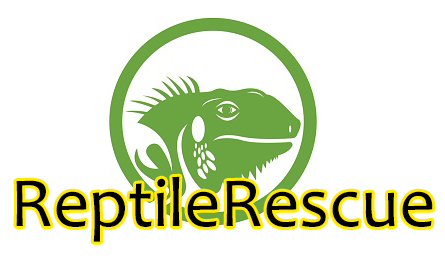
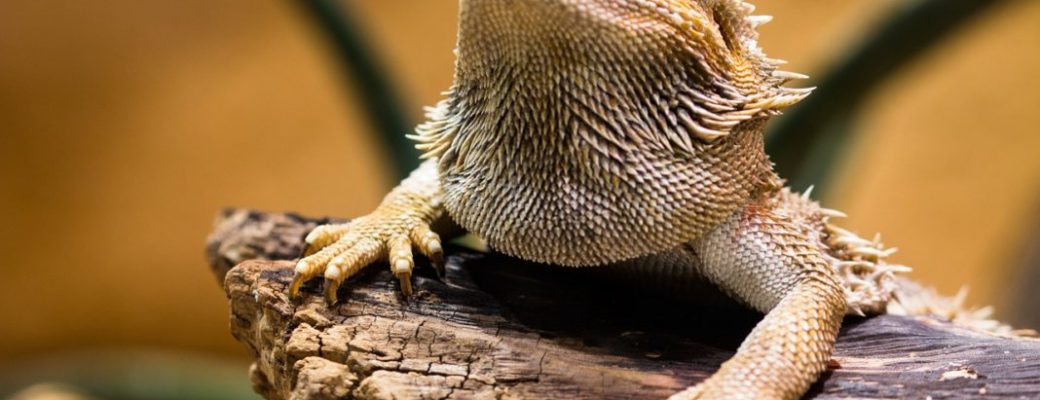
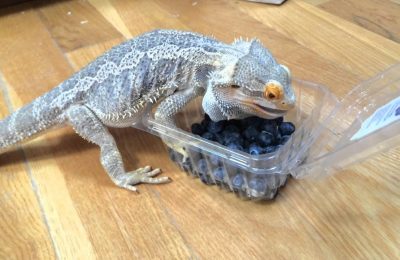
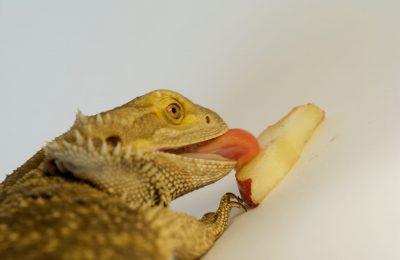
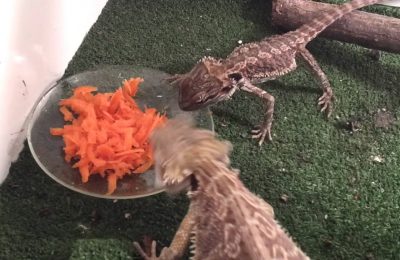
This Post Has 0 Comments